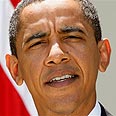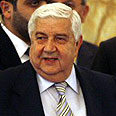


Sancho Pancha, narrates Cervantes, was encouraged. His master’s idealism was giving way to realism. Gradually regaining sanity, and eventually renouncing all chivalry, Don Quixote at last “took the house for a real inn, and not for a castle, as he used to do.” Sancho wondered, “how comes it about that a man who says so many good things, should relate such ridiculous stories and whimsies… Well, Heaven knows best, and the proof of the pudding is the eating.”
Iran is Obama’s pudding, and it tastes bittersweet. At last, on June 23, Obama said what he should have said 10 days before, unequivocally condemning the Iranian government's violent response to protests and supporting the demonstrators. Unfortunately, sans actions it is still too little, and possibly too late. The lost 10 days may turn out to be fateful.
The 44th president takes pride in his pragmatism, and can hardly be accused of quixotism. However, Obama’s 10 days of aloofness has nearly nullified his explicit Cairo “commitment… to governments that reflect the will of the people.” Actions may speak louder than words, but their lack hereof speaks louder than both. By pursuing pragmatic idealism, Obama may have missed a momentous opportunity to change history.
Twenty years after the fall of the Wall, 2009 might still be a watershed in the modern chronicles of the Middle East. But in his obsessive insistence not to be Bush, Obama might do worse. In an irony – no, a tragedy – of fate, Obama could have done, indeed, should have done, what Bush probably would have, but shouldn’t have – actively engage in the crisis to bring about a true change, one which, it seems, most Iranians believe in. Precisely because he is not Bush - thanks to his preference for conciliatory words over crusader swords - Obama could have provided essential impetus and support for what may still be a real revolution.
Wrong on all accounts
The president’s reasons were threefold, all remarkably pragmatic: First, the uprising is doomed, and it is not prudent to further alienate a government with which we must engage; second, it doesn’t really matter who wins, since the basic disagreement, particularly over the nuclear project, is now a basic trait of US-Iran relations; third, a clear-cut message will backfire, as the current government would abuse it for its crackdown on the opposition.
The first reason seems to resonate with the majority of the American public, who shares Obama’s pessimism. A recent Rasmussen Report survey finds that 65% say it is not likely that Iran will become free, democratic and peaceful in the short term. Hence, a plurality of respondents (43%) thinks that the president’s response has been about right. However, a significant minority (34%) says the president has not been aggressive enough in supporting Iranian reformers, and a majority rejects the Administration’s second contention: 54% believe it does make a significant difference in terms of US national security which candidate is elected president of Iran.
Obama errs on all three accounts. Syrian Foreign Minister Walid Muallem’s cheerful insight, that “anyone betting on the fall of the Iranian regime will be a loser” (22 June), is based, I guess, on the minister’s own experience with clamping down an opposition. Enough brutality is often all it takes.
However, while the origins and causes of revolutions remain a constant bone of contention, the Iranian (subsequently Islamic) revolution has already defied most hypotheses three decades ago. What remains clear is that revolutions are about timing, reaching a critical mass at a critical moment. Last month has proven, pudding-wise and otherwise, that the mass is there: the bulk of politically active Iranians would like a true change. The moment, however, may have passed, also due to America’s refusal to strike while the iron is hot, to seize the day and assist the opposition.
If it was meant as a subversive attempt to substitute a self-fulfilling prophecy with a self-defeating prophecy it was a self-defeating policy. The lack of American and Western support has certainly not motivated the Iranian opposition, but has just as certainly provided a safety net for the government’s oppressive measures.
Obama’s first reason also contradicts the second, namely, the fundamental insignificance of the opposition and its leadership to US-Iran relations.
If the Iranian government is destined to confront the US, support for the opposition would add but little to an already existing problem. If that is not enough, the second reason itself is flawed. First, although the main contender, Mir-Hossein Moussavi, has been pivotal in the opposition’s emergence, the activists have acquired a momentum that far exceeds Moussavi’s proclaimed agenda. Second, while certainly no Mandela, Moussavi may be a de Klerk or Gorbachev, both only half-intending to travel the roads they did.
Finally, Obama’s third reason has already been proven wrong. Whatever the US does, it is, and will continue to be, Ahmadinejad’s favorite scapegoat. The Iranian dictator and his cronies do not await Obama’s press conferences to target the opposition and link it to the West in general, and the evil Americans and Zionists in particular.
International intervention often the key
Pragmatism aside, one wonders what place is there really for normative arguments in Obama’s foreign policy. In his famous Few Words on Non-Intervention even John Stuart Mill seems to suggest the need for a more active approach. “No people ever was and remained free, but because it was determined to be so,” he writes, for if the people “have not sufficient love of liberty to be able to wrest it from merely domestic oppressors, the liberty which is bestowed on them by other hands than their own, will have nothing real, nothing permanent.” The Iranian proof, both to themselves and to the world, of their will to be free, thus makes an active international approach a moral imperative.
What could and should have been done? First, Instead of conveying to the dissidents “no, you can’t (not if I have anything to do with it)”, Obama should have spoken right from the start. Second, actions should be taken, short of military intervention. The US should do more than “bear witness to the courage and dignity of the Iranian people,” it should assist it. Information and communication technologies should be harnessed to aid the opposition, which quickly became the target of a North Korean style media blackout. Furthermore, the rentier foundations of the regime could be challenged by leveraging a concert international pressure on the Mullahs’ soft belly, the oil and gas industry that accounts for about two thirds of their revenues. The cost may be high in the short run, the benefit eventually immense.
International intervention, anti-Soviet dissidents are all too eager to explain, is often the key to a successful revolution. It is of little surprise that in the current crisis, former Czech president Vaclav Havel provided the earliest most unequivocal voice against the Iranian dictatorship. Obama chose otherwise, and the 2009 Summer of Teheran may end like the 1968 Spring of Prague. One may hope that the next revolutionary moment will emerge sooner than two decades from now. This summer, after all, has only just begun.
Uriel Abulof, Ph.D.
Liechtenstein Institute on Self-Determination
Woodrow Wilson School of International and Public Affairs
The Department of Near Eastern Studies, Princeton University















